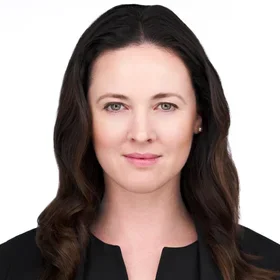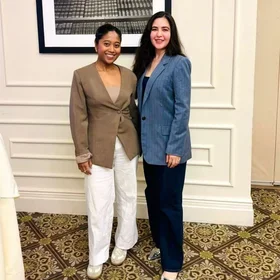Phoebe Simmer had been working as an account manager at M&C Saatchi in Australia, but she wanted to engage more deeply in branding and marketing by becoming a brand strategist. She looked to Columbia to help her take her career in a new direction.
She relocated from Sydney to New York City to enter the M.S. in Communications Practice program at Columbia University (now known as the M.S. in Strategic Communication). She credits the program for offering her the training and connections that she needed not only to shift into a branding role but also to find a position at a New York-based firm.
She graduated in 2012 and has since worked as a strategist at the global branding agency FutureBrand. She tells us, “We're working on huge multimillion and multibillion dollar companies that, in Australia, you would never have the chance to touch.”
On a scorching summer day in Manhattan, we sat down with Phoebe at an Australian cafe. Over iced coffee, we discussed her transition from Sydney to New York City and how Communications Practice helped her achieve her career goals.
I'm curious what you were doing in Australia right before you applied for and entered the program.
I did my undergrad in PR and advertising. I took a three-year course at the University of Technology, Sydney. I was working in Account Management at M&C Saatchi, a global advertising agency. I was there for about two and a half or three years and then decided to move on to strategic planning. I wanted to build out my analytical skills a bit more. I was looking around for some graduate course of study that would help me develop those skills and discovered the Communications Practice program at Columbia.
I spoke with [the director of the program]. I got a great vibe from her. She gave me a really good understanding of Communications Practice. Looking at some of the subjects they offered, they were really tailored to analytical thinking as well as finessing writing skills, presentation skills, and so on. I just felt like it really would help me get to where I wanted to go.
I wonder what made you consider Columbia, or even coming to the U.S., for your graduate studies?
[Living and working in] New York has always been a dream of mine. The career prospects over here are fantastic. There’s an internship component of the program as well. It’s great hands-on experience that you can’t get elsewhere.
I wonder how you were able to transition to the U.S. and New York, coming from Australia. How did you make that jump?
The course of study transitions you to New York very smoothly. You've got orientation week, and there's such a strong international community within the program. I think half of my class was international. I had that support network of people who were going through a similar shift and didn't really know anyone. We all kind of relied on each other. It was great.
The International Students and Scholars Office (ISSO) staff was fantastic in helping with visas. I got paid for my internship, so they had to guide me through [the paperwork]. They understood how to navigate it all.
I think the other thing for international students is that, [depending on your program and your student visa status], you may get a one-year working visa afterwards. Going into the job market after Columbia, you're not going in straight away as an international student asking for a sponsorship. It gives you that year to prove yourself and make them want to sponsor you. That was a huge benefit. For those students who wanted to stay on in New York afterward, that was really helpful.
I'm curious where you interned while you were in the program.
I interned at the company where I’m now working, FutureBrand, a global branding consultancy. I landed a summer internship working in the strategy department as an analyst, which was fantastic. I worked with them for three and a half months over the summer [while I was in the program]. Then when I graduated, they offered me a full-time role. I've been there ever since.
What do you do at your current job?
I'm a brand strategist. It's about repositioning brands. For example, we relaunched Pitney Bowes at the beginning of last year. These are brands that are going through a transition phase. We're redefining them and what their future should look like. It's what I wanted to do going into the program, and it's been really interesting.
Is there anything that you wanted to mention about the program, or your career, or the Columbia experience – or even the New York experience?
I think the network of people in your cohort is really beneficial. Even with the alumni who weren't in my grade, there was a very strong community, and people were always trying to help other students out. Having that network in the city was really great. You just don't get that elsewhere.


